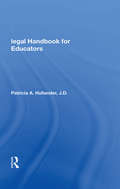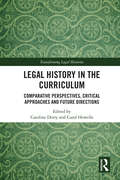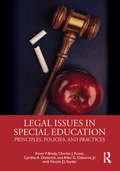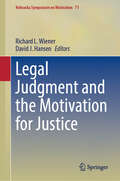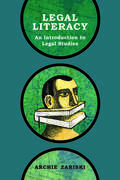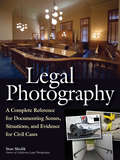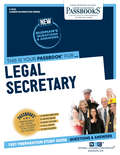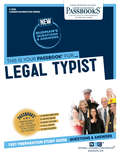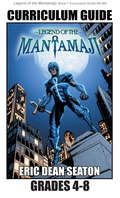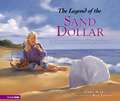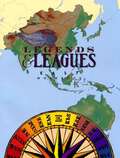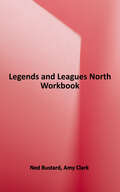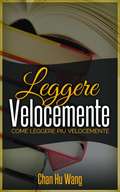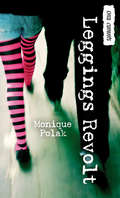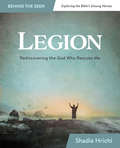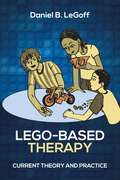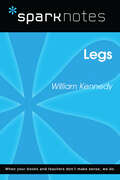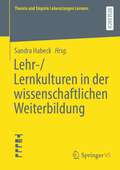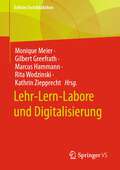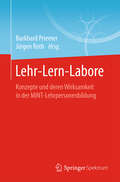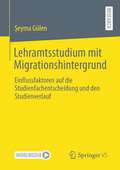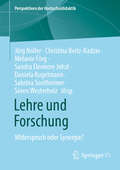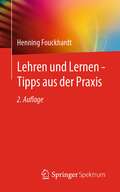- Table View
- List View
Legal Handbook For Educators
by Patricia HollanderA welter of new laws, newly applied laws, and judicial decisions has altered the character of educational instruction and administration; in many respects, the nature of the faculty member's and administrator's legal responsibility has undergone a drastic change. At a time when grave risks exist in the failure to follow legally defined procedures,
Legal History in the Curriculum: Comparative Perspectives, Critical Approaches and Future Directions (Transforming Legal Histories)
by Caroline Derry Carol HowellsAs legal education faces fresh challenges and opportunities, and a growing literature calls for subversive new approaches, this book engages with vital questions about the place of history in the law school. How and why should we teach legal history? What is its place in the curriculum? What can different jurisdictions learn from each other? This collection offers an overview and examples of cutting-edge practice in teaching legal history across the law curriculum, challenging expectations of its place and potential. The book’s three sections explore practices and possibilities in the core curriculum, in dedicated legal history courses and in law schools across the world. They highlight how legal history offers diverse and inclusive content, global perspectives, and transnational understandings to students. By exploring contributors’ own purposes and practices, they provide insight and fresh ideas on how and why readers can incorporate legal histories into their own teaching.The volume will be an invaluable resource for all those involved in the teaching of law and the law school curriculum.
Legal Issues in Special Education: Principles, Policies, and Practices
by Charles J. Russo Kevin P. Brady Cynthia A. Dieterich Allan G. Osborne, JrLegal Issues in Special Education provides teachers and school administrators with a clearly written, well-organized, and understandable guide from the perspective of the practitioner without formal legal training. Even though over 50 percent of students with disabilities are now educated in general education classes, most teachers are not required to complete coursework in special education law and can unwittingly expose themselves and their schools to liability for violating the rights of students with disabilities. This practitioner’s guide explicitly addresses the major issues and legal complexities educators inevitably face when dealing with special education legal and policy issues. Using case-based learning to synthesize important legal concepts and principles from leading special education legal cases, this text guides educators, administrators, and parents alike toward a thorough understanding of, and the ability to navigate, many of the current and pressing legal concerns in special education.
Legal Judgment and the Motivation for Justice (Nebraska Symposium on Motivation #71)
by David J. Hansen Richard L. WienerThis volume takes as its point of departure that those who work in the area of law and psychology currently possess a great deal of knowledge about the psychology of the legal system, including the way in which the behavior of legislators, judges, jurors, attorneys, litigants, and defendants shapes the outcome of justice. It has also become very clear that the main obstacles to beneficial modifications to the legal system stem from the lack of motivation to seek justice, motivation to change legal process, and motivation to make use of evidence-based decision making. The purpose of this volume is to examine the antecedents of the motivation for justice, describe how that motivation activates and manifests in various legal institutions (i.e., elections, legislatures, courts, and executive offices), and trace the failure of that motivation to influence legal decision making. This will include research and commentary about a) where the motivation for justice comes from when people make legal judgments and decisions, b) how the motivation for justice influences legal judgments and decisions, and c) how legal judgments and decisions influence the motivation for justice in positive and negative ways. This topic is paramount at the current time in our history in view of the apparent breakdown of society&’s beliefs in our institutions and trust in the democratic process, which has contributed to a system that has increasingly operated from tribalistic impulse rather than from a richer motivation for authentic justice.
Legal Literacy: An Introduction to Legal Studies
by Archie ZariskiTo understand how the legal system works, students must consider the law in terms of its structures, processes, language, and modes of thought and argument—in short, they must become literate in the field. Legal Literacy fulfills this aim by providing a foundational understanding of key concepts such as legal personhood, jurisdiction, and precedent, and by introducing students to legal research and writing skills. Examples of cases, statutes, and other legal materials support these concepts. While Legal Literacy is an introductory text, it also challenges students to consider critically the system they are studying. Touching on significant socio-legal issues such as access to justice, legal jargon, and plain language, Zariski critiques common legal traditions and practices, and analyzes what it means “to think like a lawyer.” As such, the text provides a sound basis for those who wish to pursue further studies in law or legal studies as well as those seeking a better understanding of how the legal field relates to the society that it serves.
Legal Photography
by Stan SholikWhile the number of assignments available in many photographic specialties is decreasing, there are still relatively untapped growth areas for still photographers and videographers. One of these specialty fields is legal photography.Legal photography involves working closely with lawyers in law firms to provide photographic or video documentation relevant to their civil, not criminal, cases. It can involve a range of other photographic specialties from macro photography to architectural photography. No matter what is involved in a legal photography assignment, it is generally interesting and presents a new, unique set of problems to solve. Legal photography is far more technical than creative, but it is also in demand and is financially rewarding.Civil cases brought to arbitration or jury trial range from simple to complex. Common to all cases is the need to present evidence in a fair and accurate manner. In this book, readers will learn how to take responsibility for ensuring that the images captured and delivered for presentation are a "fair and accurate representation" of the observed scene. That responsibility begins with the choice and use of the proper equipment (e.g., camera type, sensor size, capture mode, the correct focal-length lens for the job), through the techniques used during image capture (exposure, lighting, camera angle, camera-to-subject distance, white balance, etc.), to the processing of the captures for output. Sholik also points out that documentation is required for each step to ensure all parties that the representation is indeed fair and accurate-and the details of how this can be accomplished are outlined in this book as well.Also covered is information about how to proceed should you be asked to give testimony as to the accuracy of your work and information about the requirements to be deemed an "expert witness." For most photographers, doing assignments in the field of legal photography is the easy part. Getting the assignments can be more of a challenge, so the process of marketing yourself as a legal photographer is covered.
Legal Rights of Teachers and Students
by Stephen B. Thomas Martha M. Mccarthy Nelda H. Cambron-McCabeAn overview of public school law
Legal Secretary: Passbooks Study Guide (Career Examination Series #C-1343)
by National Learning CorporationThe Legal Secretary Passbook® prepares you for your test by allowing you to take practice exams in the subjects you need to study. It provides hundreds of questions and answers in the areas that will likely be covered on your upcoming exam, including but not limited to: grammar, usage and punctuation; keyboarding practices; legal terminology, documents and forms; office practices; spelling; and more.
Legal Typist: Passbooks Study Guide (Career Examination Series)
by National Learning CorporationThe Legal Typist Passbook® prepares you for your test by allowing you to take practice exams in the subjects you need to study. It provides hundreds of questions and answers in the areas that will likely be covered on your upcoming exam, including but not limited to: grammar/usage/punctuation; keyboarding practices; legal terminology, documents and forms; office practices; spelling; principles of word processing; and more.
Legend of the Mantamaji: Grades 4 - 8
by Brandon Palas Eric Dean Seaton Sheila UnwinEducation goes epic! The Legend of the Mantamaji series provides great examples of modern, diverse heroes in comics for your students! We have developed curriculum guides for two groups of students: grades 4-8 and grades 9-12. Each curriculum guide includes: Pre-reading activities, Social studies activities, Math & science activities, Vocabulary lists, Vocabulary activities, Graphic organizers, Creative lessons, Writing activities, and Post-reading activities. The “Legend of the Mantamaji graphic novel series is a sweeping tale of magic and mystery, with a fresh look, a modern setting—and an ancient beat.
Legend of the Sand Dollar: An Inspirational Story of Hope for Easter
by Chris AuerEight-year-old Kerry loves the ocean. But on this visit to the beach, she discovers a little-known treasure and learns of the story of Easter revealed in the sand dollar. Now you and your child can discover the story behind this small ocean treasure as stunning illustrations form the backdrop for this familiar seaside legend. Seen through the eyes of children, The Legend of the Sand Dollar shares the timeless hope of resurrection and new life—the promise of Easter.
Legends and Leagues East Workbook
by Amy Clark Ned BustardThis workbook includes comprehension worksheets with vocabulary for each chapter of the storybook, along with maps and study questions of each region—optional activity worksheets, such as Local Flavor, Legends, Sightseeing, and Souvenirs.
Legends and Leagues North Workbook
by Amy Clark Ned BustardThis workbook includes comprehension worksheets with vocabulary for each chapter of the storybook and maps and study questions for each region—optional activity worksheets, such as Local Flavor, Legends, Sightseeing, and Souvenirs.
Leggere Velocemente: Come leggere più velocemente
by Simona Leggero Chan Hu WangImpara a leggere nel modo giusto. Sblocca i segreti della tua mente e ti permetterai di ottenere un processo informativo più veloce e megliore di molte persone. Leggere velocemente è una capacità che ti permette di godere dei seguenti vantaggi: 1. Coprire più materiali scritti raddoppiando oppure tripliando il numero di parole che puoi leggere in un minuto. 2. Diventare più attento alle informazioni che sono importanti 3. Limitare oppure eliminare le distrazioni. 4. Diventare più focalizzati nel matieriale per una migliore la comprensione ed il mantenimento delle informazioni. Quelli che possono leggere velocemente dicono che possono leggere ad una velocità di 1000-1700 ppm, il che significa che possono leggere il capitolo successivo di questo libro almeno tre volte più velocemente di noi. Cosa vorresti raggiungere con gli stessi risultati? Quando trascuri la lettura ed ottieni abitudini di una buona lettura, rimarrai bloccato al livello elementare della lettura e questo di impedisce di ottenere il massimo da ogni testo! E' ora di migliorare la tua capacità di lettura! Dai uno sguardo ai contenuti di questo eBook: Capitolo 1: Prima di leggere veloce, prima LEGGI Capitolo 2: E' difficile leggere veloce? Capitolo 3: Perché non puoi ancora leggere come un lettore veloce ? Capitolo 4: Scoprire cosa funziona per te Capitolo 5: Migliorare l'efficienza degli occhi Capitolo 6: Gestire le voci Capitolo 7: Centrare il punto velocemente Ora sei pronto per iniziare a leggere velocemente? Diventa un lettore migliore. Leggi molto. Scarica la tua copia ora!
Leggings Revolt (Orca Currents)
by Monique PolakEric and his buddies have left behind their all boys school to attend high school with girls. Eager to find his place in this exciting new world, Eric joins the student life committee, unaware that he is expected to enforce the school's strict dress code. The dress code is particularly harsh on the girls he is keen to get to know. Eric finds this awkward, but it's nothing compared to the position he finds himself in when the whole school revolts.
Legion: Rediscovering the God Who Rescues Me
by Shadia HrichiWitness the Divine Power of Jesus That Transforms a Demoniac into a Disciple.Legion—a man known only by the name of the demons that tormented him— is not a famous person in the Bible. Do you know his story? Climb into the boat and follow Jesus on his mission of rescue, and then celebrate the ways that God’s sovereign power and relentless love can bring deliverance to any wounded soul, including yours.Sometimes we feel trapped and alone. But there is nothing that God cannot overcome. Through this six-week, in-depth Bible study, you will discover how God is working to bring redemption and deliverance to your life.
Lego-Based Therapy: Current Theory and Practice
by Daniel B. LeGoffThis book provides a description of the current theory and methodology of LEGO-based therapy (LBT) for social development. It is intended for all readers who have an interest in LBT and both how and why it works to improve the development of social commun
Legs (SparkNotes Literature Guide Series)
by SparkNotesLegs (SparkNotes Literature Guide) by William Kennedy Making the reading experience fun Created by Harvard students for students everywhere, SparkNotes is a new breed of study guide: smarter, better, faster. Geared to what today's students need to know, SparkNotes provides: *Chapter-by-chapter analysis *Explanations of key themes, motifs, and symbols *A review quiz and essay topicsLively and accessible, these guides are perfect for late-night studying and writing papers
Lehr-/Lernkulturen in der wissenschaftlichen Weiterbildung (Theorie und Empirie Lebenslangen Lernens)
by Sandra HabeckDer Sammelband betrachtet Lehr-/Lernkulturen in der wissenschaftlichen Weiterbildung aus mikro-, meso- und makrodidaktischer Perspektive.Unter diversen theoretischen sowie forschungsmethodischen Zugängen werden in den Beiträgen zentrale Aspekte und Fragestellungen hinsichtlich des Lehrens und Lernens in der wissenschaftlichen Weiterbildung beleuchtet und analysiert. In den einzelnen Forschungsarbeiten rücken unter anderem kontextspezifische als auch fachkulturelle Differenzierungen, immanente Spannungsverhältnisse sowie schließlich bedeutsame Ausrichtungen der Lehr-/Lernkulturen in der wissenschaftlichen Weiterbildung in den Blick.
Lehr-Lern-Labore und Digitalisierung (Edition Fachdidaktiken)
by Gilbert Greefrath Marcus Hammann Monique Meier Rita Wodzinski Kathrin ZiepprechtMit der zunehmend intensivierten Verbindung von Lehr-Lern-Laboren und Digitalisierung werden in bestehenden Lehr-Lern-Laboren digitale Angebote integriert, neue Lehr-Lern-Labore mit digitaler Ausrichtung aufgebaut sowie rein digitale, fachübergreifende Labor-Formate an den Hochschulen als „Raum“ zum digitalgestützten Lehren und Lernen etabliert. Der Band greift jene aktuellen, digitalgeprägten Strömungen in der Lehr-Lern-Labor-Landschaft auf und beschreibt konzeptionell sowie empiriebasiert Veränderungen der Merkmale von Lehr-Lern-Laboren infolge des Einbezugs von Digitalisierungsaspekten in den MINT-Fächern sowie den Bildungswissenschaften.
Lehr-Lern-Labore: Konzepte und deren Wirksamkeit in der MINT-Lehrpersonenbildung
by Jürgen Roth Burkhard PriemerAn verschiedenen Hochschulen werden in den MINT-Fächern Schülerlabore in die Lehrpersonenbildung integriert. In diesen - als Lehr-Lern-Labore bezeichneten - Einrichtungen werden MINT-Lernumgebungen für Schülerinnen und Schüler, Veranstaltungen der Lehrpersonenbildung und an vielen Standorten auch fachdidaktische Forschung fruchtbar miteinander verknüpft. Das Ziel ist dabei, evidenzbasiert innovative Lehrkonzepte für Schule und Hochschule zu entwickeln und zu implementieren. In diesem Band werden Lehr-Lern-Labore zunächst allgemein beschrieben und dann durch zahlreiche Beispiele von Konzepten verschiedener Hochschulstandorte illustriert. Darüber hinaus wird berichtet, welche Wirksamkeit Lehr-Lern-Labore bei der Förderung von Kompetenzen zukünftiger Lehrpersonen haben und wie Studierende diese Einrichtungen wahrnehmen. Die vorgestellten Forschungsergebnisse, die aus einem Verbund von sechs Hochschulen stammen, sollen durch diesen Band weiteren Standorten zugänglich gemacht werden. Dieses Buch richtet sich an Studierende und Dozierende der Lehrpersonenbildung in Hochschulen - insbesondere in den MINT-Fachdidaktiken - sowie an Personen in Schule und Referendariat.
Lehramtsstudium mit Migrationshintergrund: Einflussfaktoren auf die Studienfachentscheidung und den Studienverlauf
by Șeyma GülenWeshalb gibt es so wenige Lehrkräfte mit Migrationshintergrund an Schulen in Deutschland? Dieses Buch liefert anhand der Analyse des Studienwahlverhaltens und des Studienerfolges von Lehramtsstudierenden mit und ohne Migrationshintergrund Antworten auf diese Frage. Die empirischen Befunde - basierend auf den NEPS Daten - zeigen, dass die Ursachen der Unterrepräsentanz von Lehrkräften mit Migrationshintergrund stärker auf die Studienwahl als auf den Studienerfolg zurückzuführen sind. Studienberechtigte mit Migrationshintergrund zeichnen sich in ihrer Berufswahl durch Merkmale aus, die die Wahl eines Nicht-Lehramtsstudienganges begünstigen. Dazu zählen unter anderem eine hohe Aufstiegsorientierung sowie Risikobereitschaft und ein bilingualer Habitus. In ihrem Studienerfolg unterscheiden sich Lehramtsstudierende mit und ohne Migrationshintergrund hingegen nicht wesentlich voneinander. Die Autorin Șeyma Gülen hat am Institut für Soziologie der Georg-August-Universität Göttingen im Bereich der Migrations- und Bildungsforschung promoviert. Derzeit arbeitet sie als wissenschaftliche Mitarbeiterin an der Leibniz School of Education in Hannover.
Lehre und Forschung: Widerspruch oder Synergie? (Perspektiven der Hochschuldidaktik)
by Jörg Noller Christina Beitz-Radzio Daniela Kugelmann Sabrina Sontheimer Sören Westerholz Melanie Förg Sandra Eleonore JohstDer Sammelband ist der Frage gewidmet, wie sich Forschung und Lehre zueinander verhalten. Hochschulmitarbeitende stehen vor der Herausforderung, Forschung und Lehre in einem Spannungsfeld aus Anreizsystemen, Zeitmangel und persönlichen Interessen unter einen Hut zu bringen. Dabei wird der Renommee bringenden Forschung oftmals der Vorzug gegeben, die Lehre dabei zum notwendigen Übel reduziert. Doch stehen Forschung und Lehre wirklich in einem Widerspruch? Oder ist es nicht auch möglich, dass die Forschung durch die Lehre, und die Lehre durch die Forschung profitiert, so dass zwischen beiden eine synergetische Wechselwirkung bestehen kann?
Lehren und Lernen - Tipps aus der Praxis
by Henning FouckhardtIn diesem Buch fasst Prof. Fouckhardt konkrete Tipps für motivierende Lehre und konzentriertes Lernen aus seiner jahrzehntelangen Lehrerfahrung zusammen: Gute Lehre hat mit Detailarbeit zu tun, mit Motivierung, guten Überleitungen, flexiblem Einsatz von Hilfsmitteln und Mut zum Fordern von Leistung. Gutes Lernen und Studieren beinhalten viel Konzentration und Übung, das Annehmen der Aufgabe, statt zu versuchen, sie zu umgehen. Denn nur Themengebiete, die man sich selbst erschließt, kann man auch wirklich verstehen.Nach zehn Tipps für gute Vorträge und Lehre sowie gutes Lernen geht der Autor auch auf Aspekte der Online-Lehre ein. Den Abschluss des Buches bilden Kommentare des Autors zu ausgesuchten Themen – vom Tafelanschrieb über Hubschraubereltern zu dem manchmal nicht offensichtlichen, aber doch wichtigen Sinn des Lernens und Übens sowie dem Verkennen der Langwierigkeit des Lernens.Dieses Buch richtet sich einerseits an Schüler, Schülerinnen und Studierende, die wissen möchten, wie sie besser und effektiver lernen können. Andererseits spricht es Dozentinnen und Dozenten an, denen ihre Schüler/innen oder Studierenden und die Lehre am Herzen liegen. Kurzweilig und unterhaltsam, mit realen Beispielen gefüttert, regt das Buch zur Reflexion des eigenen Lehr- und Lernverhaltens an.
Lehren und Lernen im Wandel: Innovative Wege für Schule und Unterricht im 21. Jahrhundert
by Klaus KonradDas Fachbuch richtet sich an Lehrkräfte aller Schularten, aber auch an andere Experten der pädagogischen Praxis. Es führt in Bereiche des Lehrerverhaltens ein, welche im Unterrichtsalltag bedeutsam sind. Interessierte Leser*innen erhalten Anregungen zum Verständnis und zur Gestaltung der Interaktion zwischen Lehrenden und Lernenden im System, das heißt der lernenden Organisation Schule. Kindern und Jugendlichen bessere Lern- und Lebenschancen zu ermöglichen, muss zur Leitlinie von Verbesserungsstrategien aller Beteiligten des Bildungssystems werden. Dabei liegen die wirksamsten Möglichkeiten, dies umzusetzen, in den Schulen selbst. Auf die Lehr-Lern-Szenarien und die Lehrer-Schüler-Beziehungen in unseren Klassen kommt es an. Die Dimensionen von KEYS (Keys to Excellence in Your Schools – international bewährtes Konzept der Schulentwicklung) fungieren als roter Faden des Buches. Dazu gehören Anregungen und Beispiele für eine wertschätzende, lernerorientierte und integrative Form der (Aus)Bildung. Zuallererst wollen wir es Schüler*innen ermöglichen, mit aktuellen Anforderungen zurechtzukommen und sich in Zeiten des Wandels und der Unsicherheit zu entfalten. Für Lehrpersonen von besonderem Interesse sind vermutlich vier Fragen: 1. Wie gestalte ich verstehens- und problemorientierten Unterricht?, 2. Was sind sinnvolle didaktische Reaktionen auf die vorfindbaren Begabungs und Leistungsunterschiede?, 3. Wie kann ich in Zeiten des Wandels und der Unsicherheit mit meinem Beruf zurechtkommen?, 4. Wie kann ich meinen Arbeitsplatz in einer lernenden Organisation aktiv (mit)gestalten?
